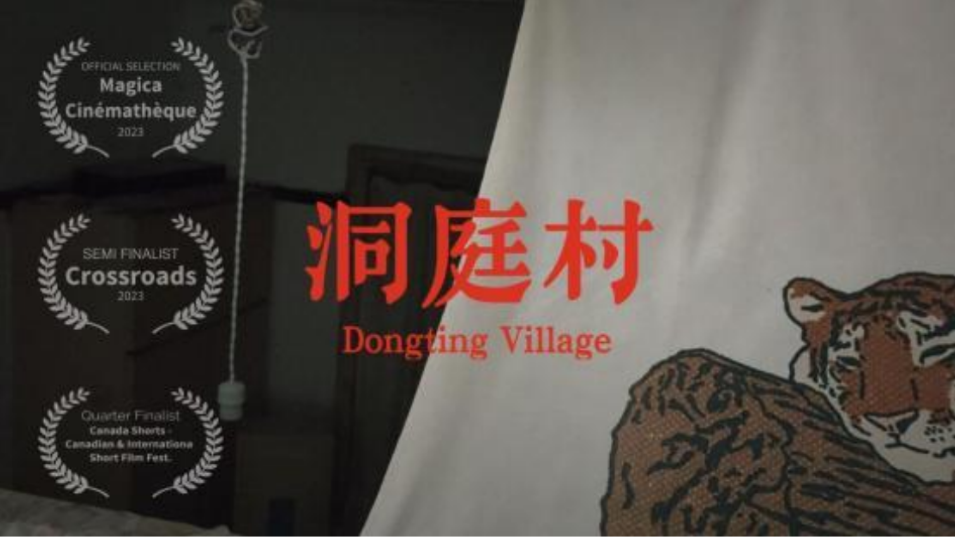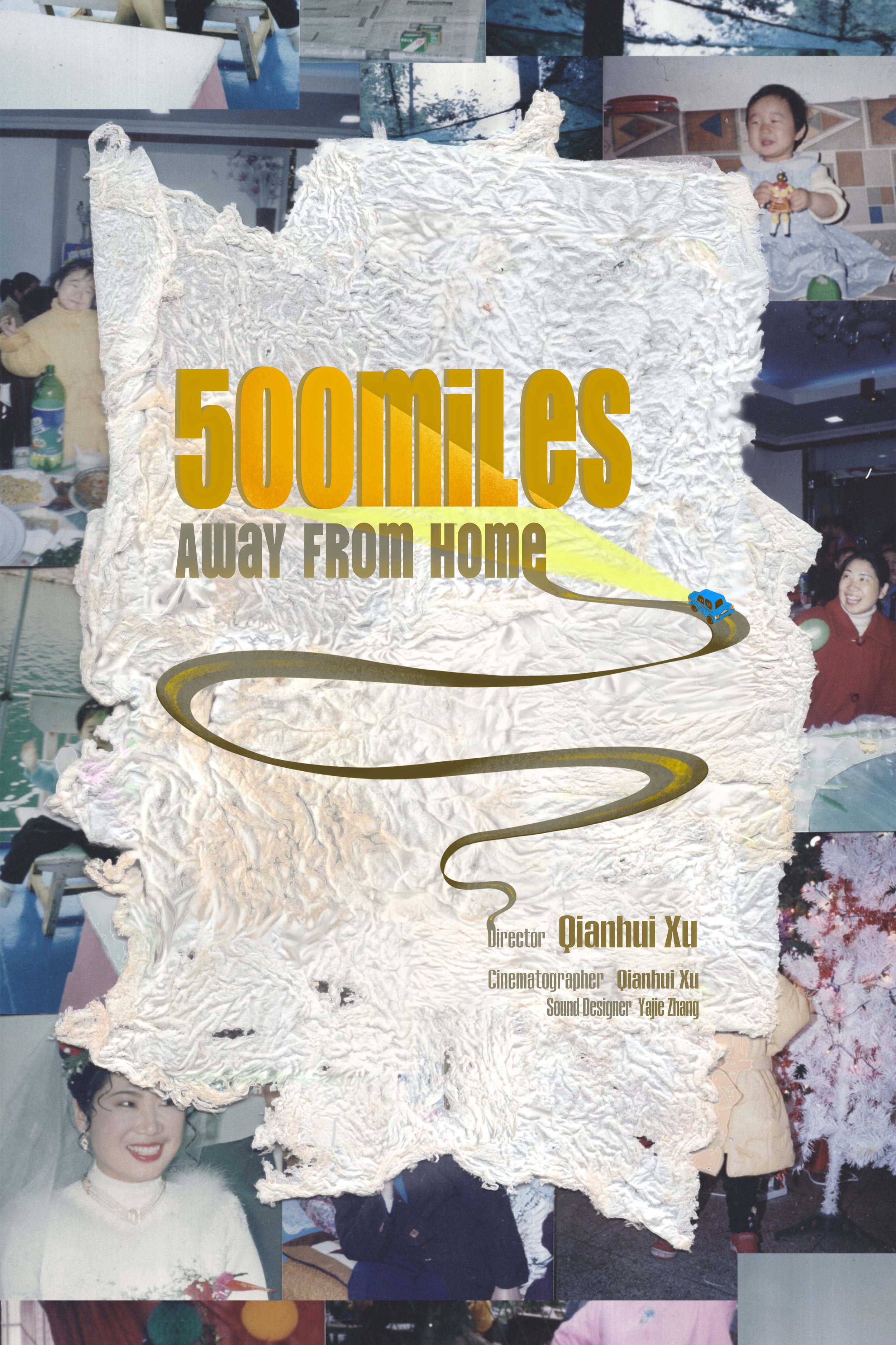Sunday July 7 * 7pm * $10-20 * TICKETS
We are pleased to welcome filmmaker Qianhui (Joyce) Xu for a screening and in-person Q&A following the films.
“Dongting Village” is an experimental short film about “Passing Time in A Still Space”. The apartment that we filmed is located in Wuhan, China. It has been in use for almost 100 years. Local tycoons in British colonial era, movie stars during World War II, and cleaners under the Cultural Revolution had all lived here, and it is now occupied by an underground artist who makes a living by doing part-time work. The film displays a day of this house in the post-pandemic period. Although everything seems 'normal', the viewer is able to feel the 'time' as it is meant to be, through the information conveys by sound and images. Since Wuhan became notorious worldwide as the outbreak site of Covid, it and its residents have been living in a historical narrative constructed by different political forces. As an independent artist, I wish that I can keep a slice of the real time, history and life.
”500 Miles Away From Home” is a film about love and forgiveness. The two main characters use their own experiences and actions to show us how to heal past wounds and love themselves and each other; how to pick up lost courage, face their mistakes, accept their imperfections, and embrace the challenges of life; and ultimately achieve a real sense of peace and understanding. More than demonstrating clichéd mother-daughter conflicts and family traumas, I am more concerned with bringing bravery and hope to those who are going through or have gone through similar dilemmas.
Jiuying is a talented printmaker grappling with bipolar disorder and financial struggles. As Lunar New Year draws near, Jiuying returns to her hometown, seeking solace and resolution to the emotional turmoil between herself and her mother, Hengpei. Hengpei, a figure fixated on bodybuilding, attempts to bridge the emotional chasm by guiding Jiuying through physical exercise. However, the scars of past mistreatment and control inflicted by Hengpei haunt Jiuying, hindering her from embracing new opportunities. Amidst tearful exchanges at the dinner table, Jiuying confesses the pain buried deep within her, confronting the ghosts of their shared history. Yet, amidst the heartbreak, a transformative journey unfolds as Jiuying and Hengpei find reconciliation and healing in the vast fields of the countryside, where Hengpei's roots lie. Through shared vulnerability and mutual understanding, they discover the power of unconditional love and acceptance, transcending past grievances to dance together in a beautiful symphony of forgiveness and redemption.
Producer/Director : Qianhui Xu
Associate Producer: Xhep Xhepa
Format: Documentary Short
Running Time: 25 minutes
Genre: Observational
Foreword Qianhui Xu is an award-winning filmmaker whose work has garnered significant acclaim, including awards at prestigious international film festivals globally, such as the Golden Rooster Award, the Aporia International Village Film Festival and Canada Shorts,etc. Starting her career at the age of 19, Qianhui has contributed to numerous Chinese and American commercial fiction and non-fiction films, earning a strong reputation among her peers. However, out of her blazing desire to make documentary films, she fully transformed into an indie documentarian in 2022.
She focuses on highlighting the struggles and resilience of marginalized communities. Her exceptional skills in observational documentary filmmaking and her delicate presentation of individuals bravely facing adversity have placed her at the forefront of contemporary documentary cinema. These qualities are precisely why Rhizome DC has chosen to exhibit two of her works, "Dongting Village" and "500 Miles Away From Home," on July 7th, 2024, at 7pm.
Talk with Qianhui Xu: In My Work, the Tiger Sniffs the Rose
Rhizome DC: Qianhui, thank you for joining us today. You have had an impressive career as a filmmaker, with your work being recognized at international film festivals globally. Could you start by sharing a bit about your background and what initially drew you to filmmaking?
Qianhui Xu: Thank you for having me. My journey into filmmaking began at 19 as a script supervisor for commercial film and TV projects in China. Over the years in the US, I worked as an assistant camera on high-profile projects for clients such as the American Veterans Center and Ernest Medicine, contributing to critically acclaimed productions. However, it was in 2022 that I began transforming into an independent filmmaker, focusing primarily on documentaries that highlight individuals facing survival difficulties or survival anxiety.
Rhizome DC: Your films often center on marginalized people in difficult circumstances. What motivates you to tell these stories, and how do you approach them?
Qianhui Xu: My motivation comes from a deep admiration for individuals who navigate challenging lives. I believe their stories offer profound insights into the human condition. In my documentaries, I aim to record their spiritual explorations, lifestyles, inner battles, and relationships with their environment within a limited duration, but my artistic
approach to achieve this goal is not agitating. I prefer to show emotions and care in subtle places. It is encapsulated by the phrase "the tiger sniffs the rose," which symbolizes the balance between strength and sensitivity that I strive for in my work.
Rhizome DC: One of the striking aspects of your work is your use of Cinema Verite. Can you explain why you are drawn to this technique and how you have mastered it?
Qianhui Xu: Cinema Verite, or Direct Cinema, is a method of documentary filmmaking that captures subjects as directly and truthfully as possible. It is characterized by hand-held shooting techniques that provide an immersive experience. I am drawn to this technique because it allows me to present my subjects in their natural environments, engaging in their daily activities. Mastery of Cinema Verite comes from extensive observation, patience, and a deep commitment to authenticity. It requires me to be adaptable and responsive to the situations and schedules of my subjects while maintaining a clear vision for the story I want to tell.
Rhizome DC: Your film "Dongting Village" showcases your innovative use of sound design. Can you talk about your creative choices in this film and how they relate to the everyday realities of globalization?
Qianhui Xu: Absolutely. In "Dongting Village," sound plays a crucial role in reflecting the characteristics of the community. As someone who has lived in both Eastern and Western societies, I recognize that sounds can sometimes convey the essence of a place more effectively than images. For example, in a working-class community in Wuhan, the close spatial and social relationships mean that daily life sounds, such as arguments, waste disposal broadcasts or the intermixing of American sitcoms and traditional Chinese opera, are easily heard. This layering of sounds reflects the impact of globalization and the coexistence of different cultural influences. The sound design not only highlights the changes in the times but also emphasizes the ongoing dialogue between traditional and modern lifestyles.
Rhizome DC: Your film "500 Miles Away From Home," focuses on a deeply personal story. How did you choose Jiuying as your main character, and what steps did you take to ensure ethical and sensitive storytelling?
Qianhui Xu: Jiuying is a close friend of mine, and our relationship spans over twenty years. When both of us faced challenging times, we decided to help each other through our respective struggles. Jiuying's journey with bipolar disorder and her desire to confront her past trauma made her a compelling subject. Trust was already established, which allowed for an authentic portrayal of her experiences. To ensure ethical storytelling, I communicated openly with Jiuying and her family, explaining my intentions and seeking their consent for each scene. The process was akin to Drama Therapy, providing a therapeutic space for Jiuying and her family to address and heal from past conflicts.
Rhizome DC: You've mentioned that sound is a critical element in your films. How do you plan to continue incorporating this emphasis on sound in your future projects?
Qianhui Xu: Sound is indeed a powerful tool in my storytelling. In "Dongting Village," I used sound to convey the drama of daily life, and this approach proved to be highly effective. Moving forward, I intend to continue exploring the potential of sound to deepen the audience's understanding of my subjects' environments and experiences. Each project will dictate its own unique sound design, but the emphasis on authentic auditory experiences will remain a cornerstone of my work.
Rhizome DC: Your work has been recognized at numerous film festivals. What do you hope to achieve with your films, and where do you envision them being screened? Additionally, can you discuss the impact your films have had on audiences and the industry?
Qianhui Xu: I hope my films reach a broad and diverse audience, inspiring viewers with stories of courage, resilience, and reflection. "500 Miles Away From Home" is currently in its festival circuit and has been selected for the Aporia International Village Film Festival in Korea, where it will be screened in 20 important regions, including both big cities like Seoul and small villages near the border. Additionally, I am honored to have been invited to display both "Dongting Village'' and "500 Miles Away From Home" at the 2024 University Film and Video Association Conference in Cleveland, Ohio. I am also exploring collaborations with art galleries, mental health institutions, universities, and schools. My goal is for my films to serve as healing resources for those grappling with family trauma or other personal challenges. I am also in discussions with the Asian/Pacific Islander Domestic Violence Resource Project and Chinese American Planning Council to use "500 Miles Away From Home" in their educational programs.
Rhizome DC: You have a deep connection with the Rhizome DC community. Could you share your thoughts on this art space and its impact on your work?
Qianhui Xu: Rhizome DC is a remarkable art space in the DMV area, dedicated to self-education and supporting pioneering art and underground artists. It serves as a vital bridge between artists and the public, fostering a community where creativity and mutual support thrive. My music video for drag queen MasVusi, which was exhibited there, was a testament to the vibrant and inclusive spirit of Rhizome DC. This community has been instrumental in providing a platform for my work and inspiring me to continue exploring new artistic avenues.
Rhizome DC: Your artistic philosophy is evident in your work. Can you elaborate on your creative philosophy and how it guides your filmmaking process?
Qianhui Xu: My creative philosophy revolves around the belief that documentary filmmakers should properly represent their subjects, making sufficient observations and asking enough questions before filming. I strive to present my characters' behaviors and inform the audience of their motivations without imposing my values on the storytelling.
Rhizome DC: Thank you, Qianhui, for sharing your insights and experiences. Your dedication to authentic storytelling and your innovative approach to filmmaking are truly inspiring. We look forward to seeing more of your work in the future.
Qianhui Xu: Thank you for the opportunity to share my journey. I hope my films continue to resonate with audiences and contribute to meaningful conversations about the human experience.


